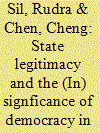|
|
|
Sort Order |
|
|
|
Items / Page
|
|
|
|
|
|
|
| Srl | Item |
| 1 |
ID:
182734


|
|
|
|
|
| Summary/Abstract |
This paper studies the effect of family size on parents' labor supply and occupational prestige, using the censuses of both Taiwan and Mainland China. We rely on the exogenous increase in child quantity that results from having twins at the first birth. Our results indicate that an increase in family size has negative effects on the labor supply of mothers but not of fathers, in both Taiwan and Mainland China. In addition, we find that in Taiwan fathers tend to switch to occupations with lower prestige scores in response to an increase in family size. However, the negative effect of family size on occupational prestige is not observed in Mainland China, where the occupational mobility is low.
|
|
|
|
|
|
|
|
|
|
|
|
|
|
|
|
| 2 |
ID:
192320


|
|
|
|
|
| Summary/Abstract |
This study investigates the relationship between family size and parents’ labor market performance, measured by labor supply and occupational prestige scores, based on three census waves in 1990, 2000, and 2010. To address the endogeneity problem of family size, we use the indicator of twins at first birth as an instrumental variable. Our results suggest that in nuclear households, family size affects the labor market performance only of mothers, not of fathers, with the negative effects fading and gradually disappearing over time. More specifically, an increase in family size decreases female labor supply in the 1990 wave, leads to lower prestige scores among working mothers in the 2000 wave, and has no impact on labor supply or occupational prestige scores in the 2010 wave. Our subsample analysis indicates that the negative effects of family size are more severe for parents of households with all children under seven years old and for husbands or wives with lower education level than that of their partners. In addition, we find that the negative effects of family size on parental labor market outcomes are not observed in extended households, especially when no grandparents are aged 65 years or older.
|
|
|
|
|
|
|
|
|
|
|
|
|
|
|
|
| 3 |
ID:
100314


|
|
|
|
|
| Publication |
2010.
|
| Summary/Abstract |
During recent years, the role of information technology in shaping politics and social movements in the digital age is drawing increasing scholarly attention. There is, however, little such literature on North Korea as the country remains almost completely cut off from the Internet. Since the mid-1990s, the DPRK government has strategically developed its information and communication technology and has subsequently built a domestic intranet. Although North Korea keeps a minimal presence on the web, there are signs that the country is taking small and cautious steps to allow some social elites to take advantage of the Internet in order to leapfrog its economic development. Indeed, a high-profile defector indicated that North Korea will most likely start allowing wider but limited internet access in the near future. This paper examines North Korea's intranet and Internet policies and explores their political implications by drawing upon first-hand data from Korean sources and existing literature as well as by juxtaposing the North Korean case with other communist regimes such as China and Cuba in terms of their attempts to control and manipulate the Internet. It shows that the DPRK government is likely to learn from the Chinese and Cuban experiences and adopt a 'Mosquito-Net' model in controlling the Internet in an effort to attract foreign investment while keeping out information deemed threatening by the regime.
|
|
|
|
|
|
|
|
|
|
|
|
|
|
|
|
| 4 |
ID:
052163


|
|
|
|
|
|
|
|